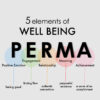Only recently have I had the opportunity to read this bestseller, which has sold 15 million copies. It is currently the most understandable and practical book among the many self-development books I have read.
Although I didn’t read because I want to improve performance, I found that these 7 habits may help improve well-being a lot. After reading it, I am afraid that I will forget it easily, so I wrote down my thoughts and share with you.
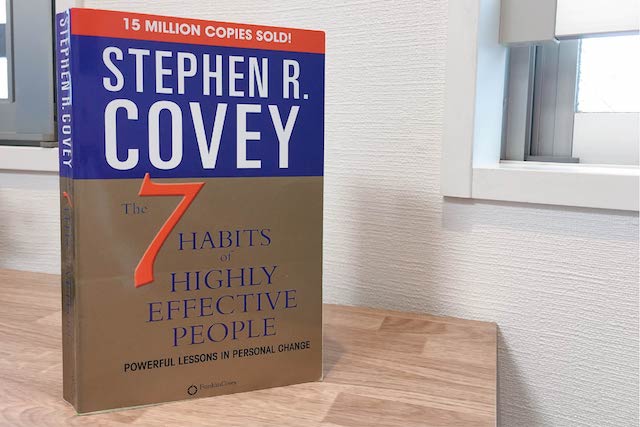
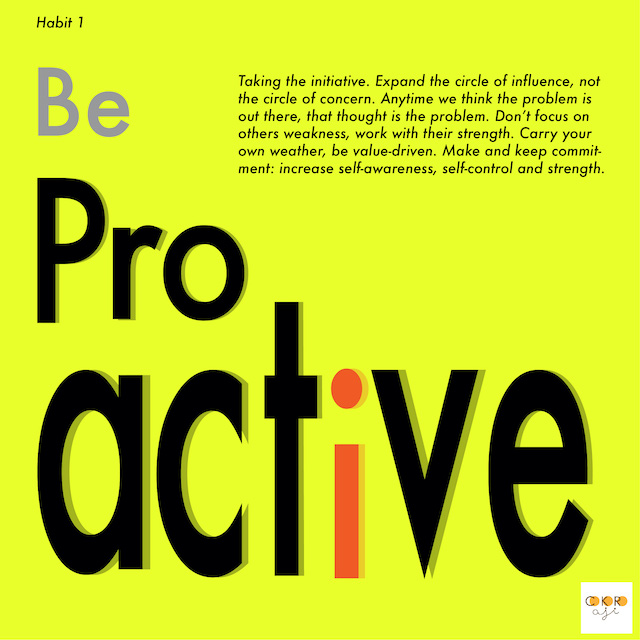
Habit 1 – Be Proactive
I remember days back in Tokyo, I saw many “problems”, big and small, sometimes I would go to the Japanese boss to point out the problems. He once said to me, “You often point out the problems, but why didn’t I see you solve the problem?” I immediately reacted in my heart: “Fuck you, I have to solve everything? Then what are other people doing? What is the manager doing? How can I have so much time? You give me double pay for solving the problems?”
After complaining for a while, I did try to solve the problems, some succeeded, some failed, but it doesn’t matter, the point is to understand, “Don’t wait for others to do it, do it yourself if you want to do it! If you see that the problem belongs to someone else, then that thinking is the problem.”
For instance, in office, we often see the shortcomings of others.
“Colleague A is very careless. He often makes mistakes and somebody has to fix it.”
“Colleague B is so useless, wasting everyone’s time.”
“Colleague C is a shoe-polisher, be careful.”
For A, B, and C, of course we have to gossip after lunch and groan in the Whatsapp group before concentrating on work.
The author believes that if you want to be effective, don’t focus on the shortcomings of others, but play and use the strengths of others.
For example, help colleague A to solve careless problems, assist colleague B to find out the root cause of the problem, and use the good relationship between colleague C and the boss to achieve other goals. (I think even Superman may not be able to do it😝)
At the same time, the author mentions two Circles, one is Circle of Concern and the other is Circle of Influence. While many things in the Circle of Concern are beyond our control, what we can and should do more is in the Circle of Influence.
For example, the weather. The weather is out of control, it is in the Circle of Concern, instead of worrying about the bad weather affecting the holiday outdoor activities, it is better to focus on the Circle of Influence – if the weather is really bad, what is Plan B?
The author said: “Bring your own weather.” I like this sentence very much, but I also find it difficult to do. Humans often get worried unconsciously, and spend all their time worrying, which doesn’t help solve the problem at all. (I know enough😓)
I read another book “The Art of Good Life” earlier and mentioned that if you have worries, try to write all your worries in a book, and then write down the solutions. If you do this every day, you will naturally less worry and take more action, so try it. 😃
Practical example sharing
After cooking lunch, there are loads of dishes to wash. I asked Curry Boy, “Can you help me wash the dishes?” He gladly said, “Sure!” But I missed one word… It should have be “Can you help me wash the dishes now?”
When I was about to prepare dinner, the pile of dishes were still in the sink. Two options flashed through my mind:
- Urge the Curry Boy to wash the dishes immediately
- I wash and start preparing dinner
Be Proactive. I chose 2.
Habit 2 – Begin with the End in Mind
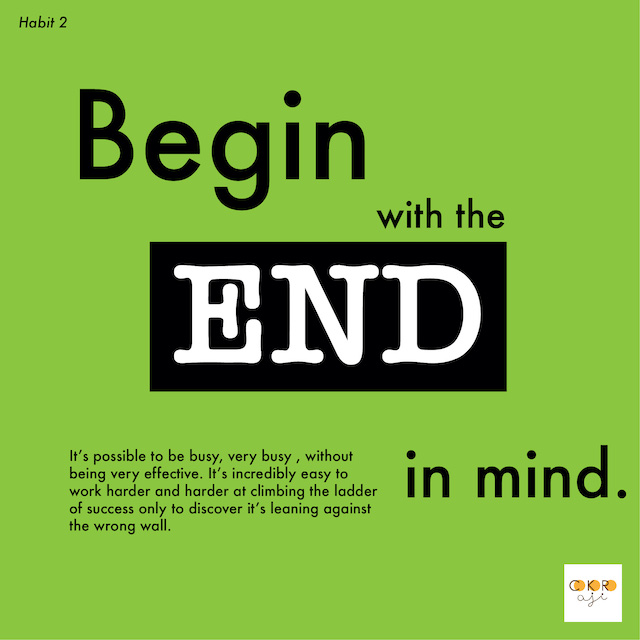
This chapter begins by asking you to imagine your own funeral. You look at your body, family and friends come to say goodbye, what do you want them to remember as a person? Would you like them to say the following to you?
Your parents said, “You have worked hard to make money all your life, which makes me proud!”
Your partner said, “We have been together for so many years, we have quarreled about big and small things, and now you have finally calmed down.”
Your children said, “I wish you could have given me more pocket money!”
Your friend said, “You usually eat well and live well, so wealthy, in fact, I really envy you!”
Your colleague said, “You are the one who worked the most overtime and worked the hardest. You should be given the best employee award.”
Author well said, ‘Most of the time, maybe you’re very busy, but it doesn’t mean you’re efficient. (……) you work hard to climb up the ladder, but do you notice, the wall which the ladder leaning against, is wrong?’
When I used to work, my timetable was based on 15 minutes as a unit, and the scheduled and actual performance of the day were recorded. If I didn’t have that schedule, and a lot of ad hoc happened at the same time, I will definitely not be able to complete my must do. But I also didn’t want to work overtime so to secure my private time, I must strictly managed my time. Later, day after day, year after year, I really felt like a hamster running around in a cage. “Why am I doing this? What is it for? What else do I get from this job other than money (and not that much)?”
Very busy, doesn’t mean there’s efficiency, nor the way you working busily is correct.
2 Creations
Every time we do one thing, there are usually 2 Creations. One is spiritual and the other is practical. For example, if you want to cook a dish, first think about how you want to cook it, what ingredients you need, and what it will taste like after you cook it… After thinking about it, cook it.
Of course, some people are full of ambitions, want to achieve ABCDE, have a clear mind, know exactly what kind of life they want, and then climb up the ladder with 200% strength. The reality is, that’s a minority, and the majority often don’t have an End Picture in mind. Many people are busy all the time, before they have time to think clearly, they devote themselves to the busy work. When they are tired one day, the light bulb suddenly turns on, “Why am I so busy?”
Try to think clearly before you take action.
Personal Mission Statement
Another key concept in this book – “Create a Personal Mission Statement”.
What I understand is that this Statement should be based on our core values. For example, some people are spouse-centred; some are friends-centred; some are work-centred; some are money-centred; and some have a couple of centre points.
This statement can’t be written in a short time, and it’s not surprising that it takes a few months, and it may need to be revised after writing, it doesn’t matter. With this statement, we will have the basis for our actions, and the ladder will not lean against the wrong wall!
Habit 3 – Put First things First
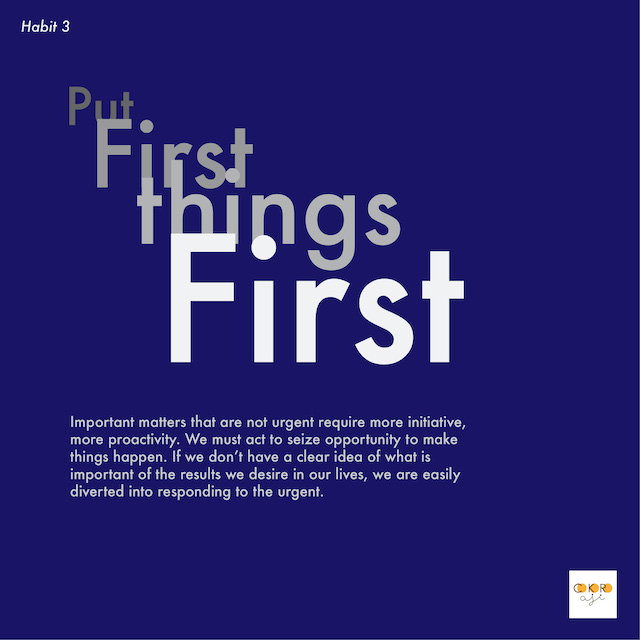
Do the following situations seem familiar to you?
You already have N tasks on hand and are rushing to do them. Suddenly, colleague A comes to you and tells you that task A is very urgent. If you don’t help him, he will not be able to proceed to the next step. As a result, if you want to help, it will take half an hour to help. Just when you were about to do your own urgent tasks, the boss said to have a quick meeting. After listening to 90% of the nonsense, another half an hour passed in a blink of an eye. Okay, I really need to get it done. Then I was concentrating on it for 10 minutes. At this time, colleague B came over and said, “Sorry, I know you are very busy, but I just want to ask you a few questions to stop you for 5 minutes!” Do you believe it is true? Is it 5 minutes? Well, I will pretend that you only asked for 10 minutes, but when I want to pick up my work again, it will take another 10 minutes to come back on what I was working on. Not counting those Whatsapp, Google chat…and a lot of emails. Suddenly there is another phone call… How many of your urgent tasks have you completed?
4 Types of Time Management
| Urgent | Not urgent | |
| Important | (1) crises, deadline driven project | (2) planning, relationship building, recognizing new opportunities, recreation, prevention |
| Not important | (3) interruptions, some calls, emails, meeting | (4) time wasters, pleasant activities, some calls, emails |
Urgent things, you can’t ignore it. But there are so many important and urgent things (1), and all I can think about is (1). All the important plans, even relaxing entertainment, but I can’t allocate time to them because it’s “Not urgent “. The same goes for exercise. We all know that exercising is good for our health, we should do it, but we don’t have time to do it because we spend all our time on (1), or have time to go to FB/IG (4). As a result, I got sick one day. Of course, it was important and urgent, so I was too busy to deal with (1) and never had time to do (2).
The author pointed out that in order to spend more time on (2), sometimes we need to learn to say NO, even say NO to urgent things. In the process of learning, we will encounter a lot of struggles, “It seems not appropriate.” (The key word in the sentence is “seems”), “It’s just for a while!” (You sure?)
Good is the enemy of great.
Jim collins
One day, 24 hours. We all have the same amount of time. But why some people can use time efficiently? It depends you spend time on(1),(2),(3)or(4)?
Habit 4 – :Think Win/Win
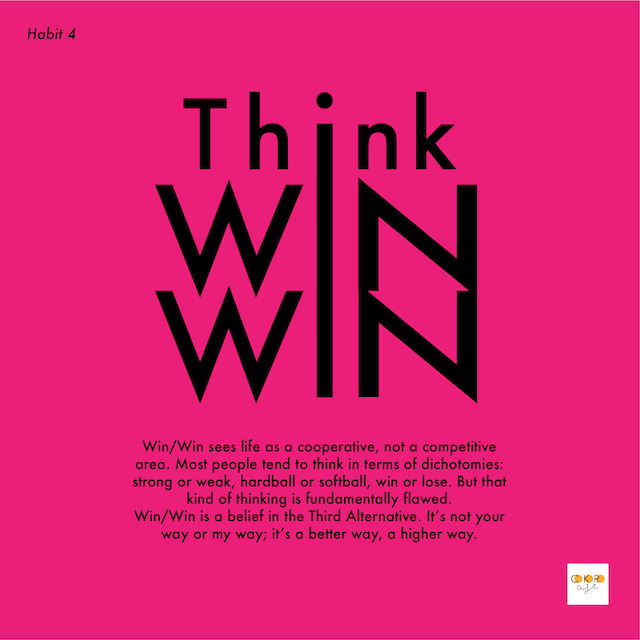
Some people say, the companies in the same industry are the enemies. But Japanese companies don’t seem to think so, at least my ex-company didn’t. They will benefit each other, work together to expand the pie, and share their success with their peers, so that both win-win.
Once I traveled to Hong Kong with a Japanese colleague on business, and one of the appointments was to go to a very well-known Japanese company to meet with their senior managers.
“Why they can spend time with us? They must be super busy.” I asked
“It’s YY San pulled the thread. He was a key person in that company.”
“Oh?! So……what’s the purpose of this meeting?”
“We want to know how do they entered Hong Kong market successfully, we need their know-how.”
“You mean, we just go straight to them, asking “hey! how do you guys do business?” That’s it? Why would they help us?”
“Because YY san has established a good relationship!”
So, we went to their office, and my Japanese colleague just asked straight forward after a stiff greeting, “Among all the Japanese business in Hong Kong, you are the pioneer. Can you share how did you achieve that?”
Then the super famous Japanese senior manager said, “To understand what customers need, then develop products.”
“Yes, right. Ummm……could you be more specific, what’s the know-how?”
“Actually it’s really important to understand what’s the customers needs. For example, if A product doesn’t fit the needs, then you have to improve it.”
I felt bad in this meeting. In other people eyes, we gave nothing, just a little good relationship with their boss whom we even didn’t know the name, then we asked for all the know-how. Shame on us. We want to win, not Win/Win.
6 Paradigms of Human Interaction
- Win/Win
- Win/Lose
- Lose/Win
- Lose/Lose
- Win
- Win/Win or No Deal
The author believes that people tend to think in a dichotomous mode – winning and losing, strong or weak… There are loopholes in this kind of thinking, especially in a society that needs to cooperate with each other. In the discussion, it is not about whether to use your method or mine. Win/Win is the third choice, a better method.
Another point worth mentioning is that many companies unconsciously apply the concept of “win or lose”. For example, the performance of each person or department is published as a race chart. This is a good example of Win/Lose. Those who are more ambitious will fight for Win/Lose, and those who have only lost but never won will lose/Win, “It’s up to you, the result is the same anyway, so you win!”. Companies often assume that the problem lies with the employees, without asking whether the system is appropriate. To achieve Win/Win, teamwork is very important. But how many companies will spend resources and time investing in team building? It’s important, but it’s not urgent. (Habit 2)
Habit 5 – Seek first to understand, then to be understood
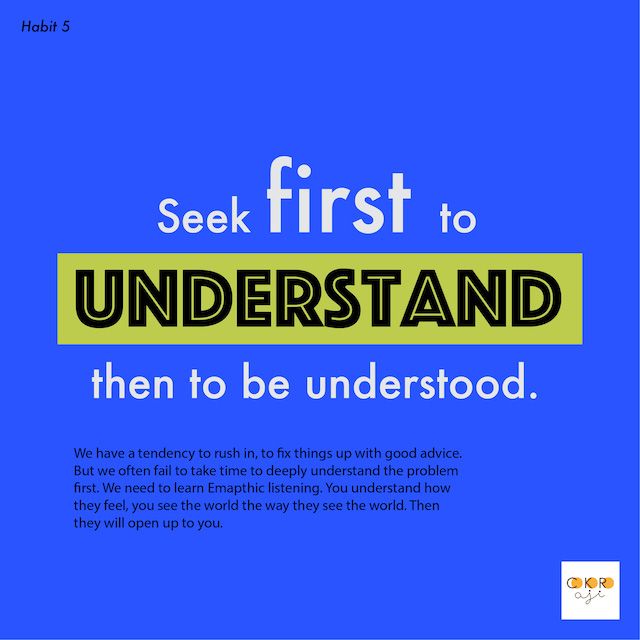
“I don’t want to talk about it, you’ll never understand.”
“If you don’t tell me, of course I won’t be understand! Tell me!”
“No! No matter how much I tell you, you won’t understand me.”
“I’ll understand you, I’m sure I will!”
Are you familiar with these conversation?
In this chapter, I agreed with the author’s view – Probably we have enough talking or speech training, what about listening?
I sometimes also talk over the other, “You mean blah-blah-blah, isn’t it?”
Diagnose before knowing the symptoms
Another dilemma usually happens within parents/elderly to children/youngsters. “You’re still young, you don’t have enough experience……” “Let me teach you, I’m sure I know more than you.” Just like the book mentioned, you haven’t told the symptoms yet, the doctor already diagnosed with confident. Surprise?
Try to listen to the other first.
For example. A son complaint, “The school sucks!” Then the father said, “Son, what’d happened?” “I can’t learn anything from school!”
Wrong Demonstration
“Oh! You haven’t got the good grip yet. I was the same years ago, but I studied hard. Just give yourself more time.” “You think I don’t know? It’s already 10 years!” (The son is going banana)
Correct Demonstration
“The school sucks.””ya the school sucks, you must be feeling terrible.” (Repeat what he said) “I can’t learn anything from school!” “Oh yes, you think the school teaches nothing useful……” (Let him know you’re listening) “I mean, you see Tony, he quitted school and found a job, much more practical!” (The son begins to tell the truth)
While reading it, I also felt that the difficulty was very high. Generally, parents would either go crazy already, or say, “You say that again! There will be no pocket money next month!” It really takes patience to do Empathic Listening. The same goes for communication between husband and wife. Although it is difficult, it takes time, I also agree that it is better than spending time to repair the relationship after a communication breakdown and a big fight. So, use this habit to remind yourself, and keep practicing!
Habit 6 – Synergize
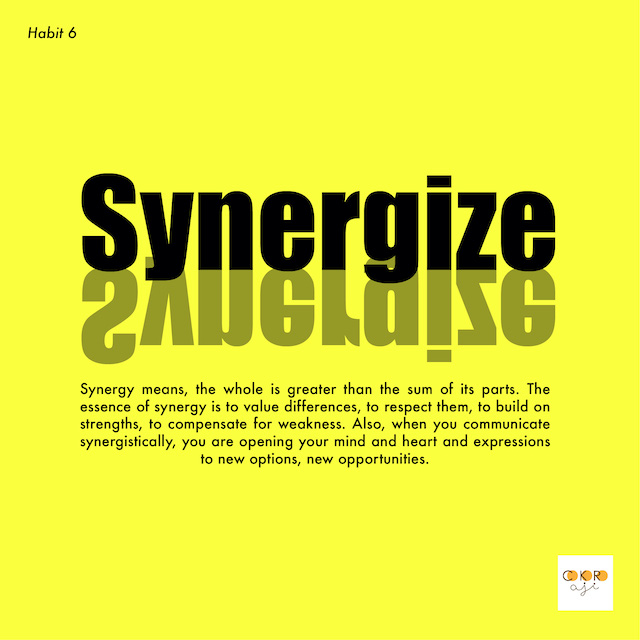
To simply put “Synergy”, it is 1+1>2. The book gives many examples to illustrate that everything is in Synergize. For example, if two plants are planted together, their roots can improve the quality of the soil and grow stronger. It is also applicable to offspring born from the combination of male and female.
Trust is the Foundation of Synergy
To communicate with synergy, you must be honest, you must open yourself first, and even talk about your own personal things, the other party will feel it and treat you with the same attitude.
Communication in Japanese Way
From personal experience, it’s a bit challenging to make friends with Japanese. When the other party is defensive, deliberately keeps a distance, and rarely talks about personal matters, it is difficult for both parties to talk about everything openly and happily. Sometimes, fighting is good. Speak out the truth, things become clear. It is good for the Japanese to treat each other with courtesy, but they seldom fight, and it is really hard to know what they really think.
1 on 1 with Manager/Boss
In the past, the company introduced bosses and subordinates to work 1 on 1 time, once a week. Although it is a small talk, it is easy for both parties to open up because they can talk about anything, such as talking about difficulties encountered at work, how they get along with colleagues, and so on. When you have doubts in your heart, instead of spending time thinking about it, it is better to communicate directly, and the problem will be solved much faster.
Habit 7 – Sharpen the Saw
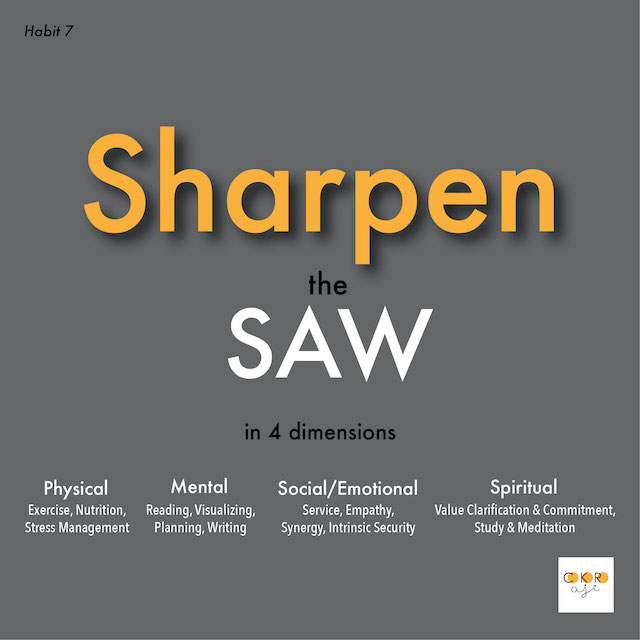
Coming to the last habit, it’s to sharpen your saw and bring all the previous 6 habits with you. The author proposes 4 aspects, including Physical, Mental, Social/Emotional, and Spiritual.
Physical – Including Stress Management
We all know the benefits of exercising, and we should do it, but we are always not doing it. I understand, I am already exhausted after get off work, and I really can’t do any more exercise. But experiments have proved that when you feel more tired mentally, moving your body is an excellent way to help you recover from fatigue. Something as simple as walking fast can give you a pleasant feeling. The ideal is to do 30 minutes or more a day of aerobic exercise that will make your heart beat faster than 100 beats per minute. Note that “very leisurely activities” are not counted, such as walking, because the heart muscles are not exercised.
I’m going to repeat again: “Have a balanced diet and stay away from junk food.” What we eat, our body responds. Not today, but in the future. As for stress management, it is another advanced subject. I won’t go into details for the time being, in a word, it is necessary to decompress well.
Remember, you can do nothing without a healthy body.
Mental – Regularly Read and Write
The book mentions research shows that the average time spent watching TV is as much as 35-45 hours a week, which is equivalent to working hours. I guess modern people also spend a lot of time on their mobile phones. In fact, there are a lot of useless programs and information on TV or the Internet. You don’t know what you have learned after watching them, but you just sit on the sofa and don’t move all night. Of course, there are many high-quality programs and information, we must choose carefully, because it is easy to fall into the bottomless flood of information.
Reading is a good habit. Firstly, the information accuracy of paid reading materials will be much higher, and secondly, the brain needs to think when reading. For example, when you read a science fiction novel, you need to imagine instead of passively receiving it like watching TV. Writing is also a good habit. Writing is a creative process, such as keeping a journal, remembering and organizing daily experiences, is conducive to mental health.
Social/Emotional – Practice Habits 4,5,6
There is no short cut in dealing with people and getting along with others. You can only practice slowly in your daily life. Listen carefully, open yourself, and abandon the idea of black and white, because Win/Win can really be done.
Spiritual – Define Your Core Value
This aspect is very much related to Habit 2. What kind of result you want in the end determines what kind of action you take; if the motivation is wrong, everything that follows will be wrong.
So, first think about what your core values are, and what kind of person do you want to be? What kind of children? What kind of partner? What kind of parents? What kind of friend?
Note that once the core values determined are changeable, meditation can help us more easily hear our inner voice. There are many methods of meditation, not necessarily sitting down and doing yoga, but listening to music, getting in touch with nature, reading, praying, etc. In short, find a method that you feel comfortable and effective.
Finally, after reading this book and understanding the message, the next and most important thing is to take action. People are the most forgetful, and after a long time, they will forget everything they have learned. I hope this blog post will help you (and me) to lead to a better life. 🙂

